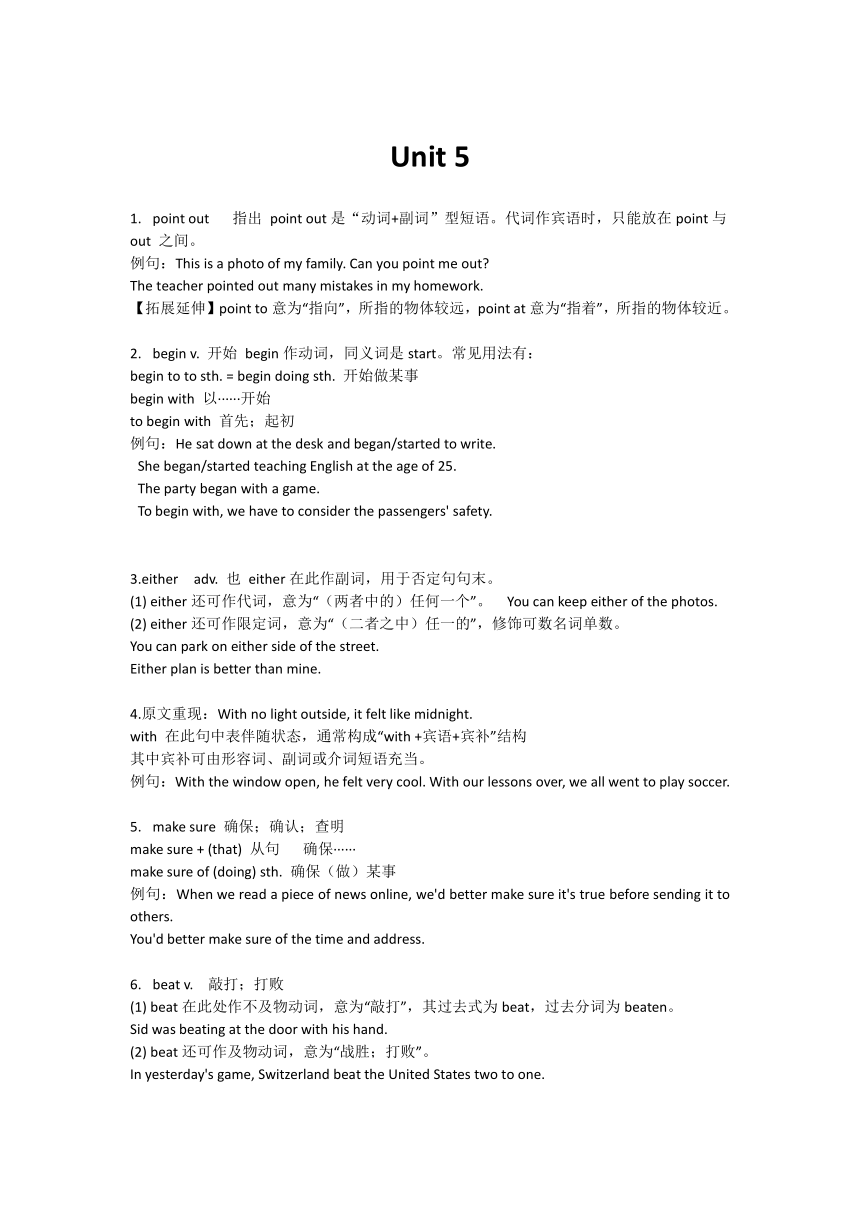Unit 5 What were you doing when the rainstorm came? 单元笔记
文档属性
| 名称 | Unit 5 What were you doing when the rainstorm came? 单元笔记 |  | |
| 格式 | zip | ||
| 文件大小 | 431.4KB | ||
| 资源类型 | 教案 | ||
| 版本资源 | 人教新目标(Go for it)版 | ||
| 科目 | 英语 | ||
| 更新时间 | 2022-05-16 20:18:58 | ||
图片预览

文档简介
Unit 5
point out 指出 point out是“动词+副词”型短语。代词作宾语时,只能放在point与out 之间。
例句:This is a photo of my family. Can you point me out
The teacher pointed out many mistakes in my homework.
【拓展延伸】point to意为“指向”,所指的物体较远,point at意为“指着”,所指的物体较近。
begin v. 开始 begin作动词,同义词是start。常见用法有:
begin to to sth. = begin doing sth. 开始做某事
begin with 以······开始
to begin with 首先;起初
例句:He sat down at the desk and began/started to write.
She began/started teaching English at the age of 25.
The party began with a game.
To begin with, we have to consider the passengers' safety.
3.either adv. 也 either在此作副词,用于否定句句末。
(1) either还可作代词,意为“(两者中的)任何一个”。 You can keep either of the photos.
(2) either还可作限定词,意为“(二者之中)任一的”,修饰可数名词单数。
You can park on either side of the street.
Either plan is better than mine.
4.原文重现:With no light outside, it felt like midnight.
with 在此句中表伴随状态,通常构成“with +宾语+宾补”结构
其中宾补可由形容词、副词或介词短语充当。
例句:With the window open, he felt very cool. With our lessons over, we all went to play soccer.
make sure 确保;确认;查明
make sure + (that) 从句 确保······
make sure of (doing) sth. 确保(做)某事
例句:When we read a piece of news online, we'd better make sure it's true before sending it to others.
You'd better make sure of the time and address.
beat v. 敲打;打败
(1) beat在此处作不及物动词,意为“敲打”,其过去式为beat,过去分词为beaten。
Sid was beating at the door with his hand.
(2) beat还可作及物动词,意为“战胜;打败”。
In yesterday's game, Switzerland beat the United States two to one.
7.against prep. 倚;碰;撞
(1) against在此处作介词,意为“碰;撞”。
The child knocked his head against the tree.
(2) against作介词,还可意为“倚着;靠着”。
The worker put the ladder against the wall.
8.asleep adj. 睡着的
rise v. & n. 升起;增加;提高
10.fallen adj. 倒下的;落下的 也是fall的过去分词形式
fallen在此处作形容词,意为“倒下的;落下的”,仅用于名词前作定语。fallen leaves 意为“落叶”。
Autumn is a beautiful season with fresh air and fallen leaves.
11.realize v. 理解;领会;认识到
realize作及物动词,其后可接名词、代词或从句作宾语。
例句:He didn't realize his mistake.
Listening is important in learning English, but he doesn't realize it.
The man laughed when he realized what had happened.
【拓展延伸】realize 还可意为“实现”,主语一般是人,后面常接dream, goal等名词作宾语。
12.make one’s way 前往;费力地前进
make one’s way意为“前往;费力地前进”,常与介词to/towards连用,表示方向,后接表示地点的名词。
We slowly made our way to the mall through the crowd.
13.recently adv. 不久前;最近
recently作副词,可用于一般过去时(表示时间点)或现在完成时(表示一段时间)中。
We received a letter from him recently.
I have been very tired recently.
【拓展延伸】recent作形容词,意为“最近的”,修饰名词
Our way of life has changed a great deal in recent years.
point out 指出 point out是“动词+副词”型短语。代词作宾语时,只能放在point与out 之间。
例句:This is a photo of my family. Can you point me out
The teacher pointed out many mistakes in my homework.
【拓展延伸】point to意为“指向”,所指的物体较远,point at意为“指着”,所指的物体较近。
begin v. 开始 begin作动词,同义词是start。常见用法有:
begin to to sth. = begin doing sth. 开始做某事
begin with 以······开始
to begin with 首先;起初
例句:He sat down at the desk and began/started to write.
She began/started teaching English at the age of 25.
The party began with a game.
To begin with, we have to consider the passengers' safety.
3.either adv. 也 either在此作副词,用于否定句句末。
(1) either还可作代词,意为“(两者中的)任何一个”。 You can keep either of the photos.
(2) either还可作限定词,意为“(二者之中)任一的”,修饰可数名词单数。
You can park on either side of the street.
Either plan is better than mine.
4.原文重现:With no light outside, it felt like midnight.
with 在此句中表伴随状态,通常构成“with +宾语+宾补”结构
其中宾补可由形容词、副词或介词短语充当。
例句:With the window open, he felt very cool. With our lessons over, we all went to play soccer.
make sure 确保;确认;查明
make sure + (that) 从句 确保······
make sure of (doing) sth. 确保(做)某事
例句:When we read a piece of news online, we'd better make sure it's true before sending it to others.
You'd better make sure of the time and address.
beat v. 敲打;打败
(1) beat在此处作不及物动词,意为“敲打”,其过去式为beat,过去分词为beaten。
Sid was beating at the door with his hand.
(2) beat还可作及物动词,意为“战胜;打败”。
In yesterday's game, Switzerland beat the United States two to one.
7.against prep. 倚;碰;撞
(1) against在此处作介词,意为“碰;撞”。
The child knocked his head against the tree.
(2) against作介词,还可意为“倚着;靠着”。
The worker put the ladder against the wall.
8.asleep adj. 睡着的
rise v. & n. 升起;增加;提高
10.fallen adj. 倒下的;落下的 也是fall的过去分词形式
fallen在此处作形容词,意为“倒下的;落下的”,仅用于名词前作定语。fallen leaves 意为“落叶”。
Autumn is a beautiful season with fresh air and fallen leaves.
11.realize v. 理解;领会;认识到
realize作及物动词,其后可接名词、代词或从句作宾语。
例句:He didn't realize his mistake.
Listening is important in learning English, but he doesn't realize it.
The man laughed when he realized what had happened.
【拓展延伸】realize 还可意为“实现”,主语一般是人,后面常接dream, goal等名词作宾语。
12.make one’s way 前往;费力地前进
make one’s way意为“前往;费力地前进”,常与介词to/towards连用,表示方向,后接表示地点的名词。
We slowly made our way to the mall through the crowd.
13.recently adv. 不久前;最近
recently作副词,可用于一般过去时(表示时间点)或现在完成时(表示一段时间)中。
We received a letter from him recently.
I have been very tired recently.
【拓展延伸】recent作形容词,意为“最近的”,修饰名词
Our way of life has changed a great deal in recent years.
同课章节目录
- Unit 1 What's the matter?
- Section A
- Section B
- Unit 2 I'll help to clean up the city parks.
- Section A
- Section B
- Unit 3 Could you please clean your room?
- Section A
- Section B
- Unit 4 Why don't you talk to your parents?
- Section A
- Section B
- Unit 5 What were you doing when the rainstorm came
- Section A
- Section B
- Review of Units 1-5
- Unit 6 An old man tried to move the mountains.
- Section A
- Section B
- Unit 7 What's the highest mountain in the world?
- Section A
- Section B
- Unit 8 Have you read Treasure Island yet?
- Section A
- Section B
- Unit 9 Have you ever been to a museum?
- Section A
- Section B
- Unit 10 I've had this bike for three years.
- Section A
- Section B
